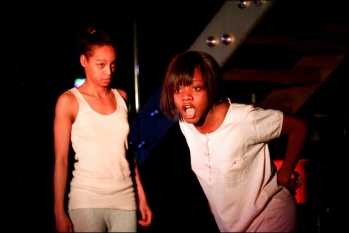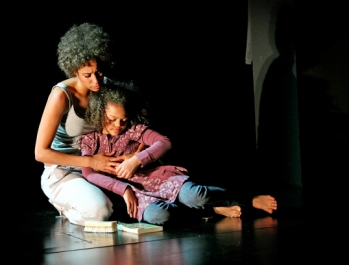Charged 1 & 2, Soho Theatre | reviews, news & interviews
Charged 1 & 2, Soho Theatre
Charged 1 & 2, Soho Theatre
Women and children in jail are theme of inspired play series
Facts first. In the last decade the number of women in prison has increased by 60 per cent: 63 per cent are in prison for non-violent offences. Between 2002 and 2009 there were 55 self-inflicted deaths by women prisoners; in 2008, there were 12,938 reported incidents of self-harm. Goodness knows how many more went unreported. Too few plays reflecting the reality of women’s lives appear on our stages - only 17 per cent of productions in English theatre are by female playwrights.
Into this gap, however, marches Clean Break, the theatre company founded more than 30 years ago by two women, encouraged by an enlightened prison governor, to start running drama works as a form of rehabilitation. At one fell swoop, Clean Break has upped the national average of plays by women with Charged, a set of six new short plays commissioned from six award-winning writers.
And when it comes to reassessing the numbers of people in prison and the way they are treated, Clean Break has Kenneth Clarke on its side. Clarke, the Justice Secretary wants to radically reduce prison numbers. Rehabilitation is his banner. The Home Office however is less keen. It will be fascinating to see whose view prevails.
Clean Break had modest beginnings. In the beginning its plays were written by ex-offenders themselves. The stories they told, hitherto hidden, rough round the edges, rang with passion and authenticity. It’s come a long way, grown into a theatre and education company that has helped steer hundreds if not thousands of women back into society through education and retraining. It has also been a launch pad for many talented new writers, two of whom – Rebecca Prichard and Chloë Moss – feature here in this, the most ambitious project Clean Break has ever attempted.
The gamble has paid off. The impact of Charged, no less disturbing and painfully personal, comes from writing of subtle understatement - plus the imaginative use of the Soho Theatre itself. This is as impressive and exciting an array of writing, acting and directing as you will see anywhere. Oh, that our major subsidised companies would take such risks.
 One of the more remarkable things about Charged is that despite violence being never very far away, it refuses to pander to sensationalism. Only in Sam Holcroft’s Dancing Bears in Charged 2 – a play that explores gang knife and gun crime – does blood flow.
One of the more remarkable things about Charged is that despite violence being never very far away, it refuses to pander to sensationalism. Only in Sam Holcroft’s Dancing Bears in Charged 2 – a play that explores gang knife and gun crime – does blood flow.
Divided into two sections, Charged 1 and Charged 2 (you can see them in either order), the plays range throughout the building, from studio to basement. For example, it was an inspired stroke on the part of director Tessa Walker to stage Rebecca Prichard’s Dream Pill underneath the theatre’s restaurant where the sound of general hubbub underscores the sense of desperate alienation of the two young girls before us.
The subject of Pritchard’s play is child-trafficking. Two Nigerian girls, Tunde and Bola aged nine and 10 (Samantha Pearl and Danielle Vitalis, pictured above), have been brought to London. In a mere half-hour Pritchard inexorably draws us into their world, their life at home in Nigeria and here in London, with a brilliantly innovative device. The two girls address questions to us, the audience, to which, of course, we cannot answer. We are made dumb before them.
By the time Tunde, the quieter of the two, is climbing the stairs to fulfil her sexual duties all lipsticked up, in spangly frock and ill-fitting high heels, we have become the most unwilling spectators and colluders. Samantha Pearl and especially Danielle Vitalis as Bola are simply outstanding in their roles – naive, enthused by their trip overseas, saturated in Nigerian superstition. And often very funny about those they encounter on the way.
 As in a daisy chain of connections, Chloë Moss’s Fatal Light takes up the theme of children, quietly piercing the soul in its account of a prison suicide by a vulnerable young mother with mental health problems. Working backwards from the event, we see how separation from her daughter proves the final straw. (Pictured left, Rebecca Scroggs with Isabella Mason.)
As in a daisy chain of connections, Chloë Moss’s Fatal Light takes up the theme of children, quietly piercing the soul in its account of a prison suicide by a vulnerable young mother with mental health problems. Working backwards from the event, we see how separation from her daughter proves the final straw. (Pictured left, Rebecca Scroggs with Isabella Mason.)
The effect – and the role grandmothers play in all this - is mirrored through a different prism in Winsome Pinnock’s Taken where a mother, a former drug addict, is accidentally reunited 20 years later with the daughter who was taken from her by social services. Pinnock produces an unexpected twist in the final minutes but her main thrust remains as much to do with addiction and drugs as mothering or grandmothers.
Charged 2 comprises the intriguingly entitled Doris Day by E V Crowe, Rebecca Lenkiewicz’s That Almost Unnameable Lust and Holcroft’s Dancing Bears. Again there is an underlying resonance between the plays. E V Crowe takes a sharp, sardonic look at two ambitious young policewomen trying to accommodate themselves to the macho work environment. Lenkiewicz, meanwhile, lightly satirises prison writing workshops whilst seriously revealing the years of domestic violence behind the crimes that led to the women’s imprisonment.
Similarly Holcroft’s Dancing Bears tries to contextualise the human lives behind the headlines of gun and knife crime in Britain’s young black community. The picture she paints – visceral, graphic and no less real for having the young black males played by four black women - is one of gruesome, inescapable peer intimidation. Offering no solution as with all the plays, Charged confronts us with complex realities of crime, the criminal justice system and those who become entangled in its web either as victims, perpetrators or custodians. Sobering, important and magnificently achieved.
- Charged runs at Soho Theatre to 27 November. See also the Clean Break website
more Theatre
 Two Strangers (Carry A Cake Across New York), Criterion Theatre review - rueful and funny musical gets West End upgrade
A Brit and a New Yorker struggle to find common ground in lively new British musical
Two Strangers (Carry A Cake Across New York), Criterion Theatre review - rueful and funny musical gets West End upgrade
A Brit and a New Yorker struggle to find common ground in lively new British musical
 Testmatch, Orange Tree Theatre review - Raj rage, old and new, flares in cricket dramedy
Winning performances cannot overcome a scattergun approach to a ragbag of issues
Testmatch, Orange Tree Theatre review - Raj rage, old and new, flares in cricket dramedy
Winning performances cannot overcome a scattergun approach to a ragbag of issues
 Banging Denmark, Finborough Theatre review - lively but confusing comedy of modern manners
Superb cast deliver Van Badham's anti-incel barbs and feminist wit with gusto
Banging Denmark, Finborough Theatre review - lively but confusing comedy of modern manners
Superb cast deliver Van Badham's anti-incel barbs and feminist wit with gusto
 London Tide, National Theatre review - haunting moody river blues
New play-with-songs version of Dickens’s 'Our Mutual Friend' is a panoramic Victori-noir
London Tide, National Theatre review - haunting moody river blues
New play-with-songs version of Dickens’s 'Our Mutual Friend' is a panoramic Victori-noir
 Machinal, The Old Vic review - note-perfect pity and terror
Sophie Treadwell's 1928 hard hitter gets full musical and choreographic treatment
Machinal, The Old Vic review - note-perfect pity and terror
Sophie Treadwell's 1928 hard hitter gets full musical and choreographic treatment
 An Actor Convalescing in Devon, Hampstead Theatre review - old school actor tells old school stories
Fact emerges skilfully repackaged as fiction in an affecting solo show by Richard Nelson
An Actor Convalescing in Devon, Hampstead Theatre review - old school actor tells old school stories
Fact emerges skilfully repackaged as fiction in an affecting solo show by Richard Nelson
 The Comeuppance, Almeida Theatre review - remembering high-school high jinks
Latest from American penman Branden Jacobs-Jenkins is less than the sum of its parts
The Comeuppance, Almeida Theatre review - remembering high-school high jinks
Latest from American penman Branden Jacobs-Jenkins is less than the sum of its parts
 Richard, My Richard, Theatre Royal Bury St Edmund's review - too much history, not enough drama
Philippa Gregory’s first play tries to exonerate Richard III, with mixed results
Richard, My Richard, Theatre Royal Bury St Edmund's review - too much history, not enough drama
Philippa Gregory’s first play tries to exonerate Richard III, with mixed results
 Player Kings, Noel Coward Theatre review - inventive showcase for a peerless theatrical knight
Ian McKellen's Falstaff thrives in Robert Icke's entertaining remix of the Henry IV plays
Player Kings, Noel Coward Theatre review - inventive showcase for a peerless theatrical knight
Ian McKellen's Falstaff thrives in Robert Icke's entertaining remix of the Henry IV plays
 Cassie and the Lights, Southwark Playhouse review - powerful, affecting, beautifully acted tale of three sisters in care
Heart-rending chronicle of difficult, damaged lives that refuses to provide glib answers
Cassie and the Lights, Southwark Playhouse review - powerful, affecting, beautifully acted tale of three sisters in care
Heart-rending chronicle of difficult, damaged lives that refuses to provide glib answers
 Gunter, Royal Court review - jolly tale of witchcraft and misogyny
A five-women team spell out a feminist message with humour and strong singing
Gunter, Royal Court review - jolly tale of witchcraft and misogyny
A five-women team spell out a feminist message with humour and strong singing
 First Person: actor Paul Jesson on survival, strength, and the healing potential of art
Olivier Award-winner explains how Richard Nelson came to write a solo play for him
First Person: actor Paul Jesson on survival, strength, and the healing potential of art
Olivier Award-winner explains how Richard Nelson came to write a solo play for him

Add comment